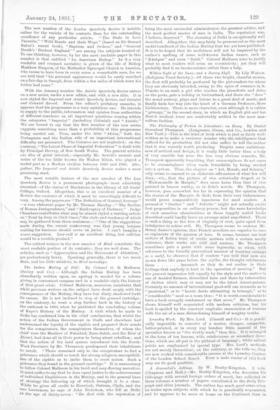The Philosophy of Piction in Literature : an Essay. By
Daniel Greenleaf Thompson. (Longssians, Green, and Co., London and New York.)—This is the kind of book which is just so fairly well- written as to make a reviewer wonder why the intelligence that sufficed for its production did not also suffice to tell the author that it was scarcely worth producing. Despite some ambitious- ness of method and design, it is really little bettor than a body of very sensible but none the loss very obvious remarks, Mr. Thompson apparently forgetting that commonplaces do not cease to be commonplaces when made formidable by being erected into a system. Thus, the chapter on "Art, Morals, and Science," only seems to amount to an elaborate affirmation of what few will deny,—viz., that the picture of vice artistically draped, as in "Mademoiselle de Maupin," does more harm than that of vice painted in brazen nudity, as in Zola's novels. Mr. Thompson, however, goes somewhat too far in expressing the opinion that the stories of the Marquis do Sado, from their very hideousness, would prove comparatively innocuous for most readers. A perusal of "Justine" and " Juliette" might not actually excite foul propensities in an ordinary person, but the mere knowledge of such nameless abominations as those happily sealed hooks described could hardly leave an average mind unpolluted. There is such a thing as the loss of virginity of soul, quite apart from indulgence in active evil. Mr. Thompson seems to endorse Mr. Henry James's opinion, that French novelists are superior to ours as exponents of the passion of love. It seems, because our best writers of fiction treat of erotic matters with a certain manly reticence, their works are cold and austere. Mr. Thompson sometimes puts a point with some ingenuity, as when, with reference to the broadly generalised manner of treating carnage as a motif, he observes that if readers "are told that men are mown down like grass before the scythe, the thought exhilarates
them . inasmuch as they do not realise in their feelings that anybody is hurt in the operation of mowing." But the general impression loft equally by the style and the matter is one of decided flatness, diversified here and there by tuberosities of diction which may or may not be the latest Americanisms. Certainly no amount of international good-will can reconcile us to "passional," or to "heroic deeds ultimating in triumph," or to " considerable " used as a noun thus : "It is worth considerable to have a book savagely condemned on that score." Mr. Thompson shows himself well acquainted with modern criticism, but his book is spoiled by the constant emphatic enunciation of truisms with the air of a man disburdening himself of weighty truths.






































 Previous page
Previous page